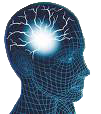Headpain and sleeplessness.
by admin
It has been known for a long time that chronic headache/migraine frequently coexists with sleep problems/insomnia (For example in one study 50% of migraineurs stated that their migraine attacks were triggered by poor sleep). Indeed in many of my patients tackling their sleep problems is a vital step to reducing the frequency of their headpain.
Some recent research to come out of the University of Rochester therefore caught my eye. They have found that the system by which the brain ‘cleans/detoxifies’ itself is 10 times as active during sleep compared to during the day.
Basically the brain produces various chemicals as a byproduct of nerve function, some of them are somewhat toxic such as the beta-amyloid amino acids, these need to be cleared out to keep the brain functioning efficiently.
The disposal process, the glymphatic system, works by pumping cerebrospinal fluid through the brain tissue thus flushing the toxins into the main blood system and then eventually to the liver where they are broken down into less toxic components. As perviously mentioned, the research found this system is much more active during sleep than it is during waking hours.
Clearly if some people are not sleeping so well this ‘self- cleaning’ system may well be less thorough, possibly leading to build up of ‘brain toxins’ which may then predispose them to subtle brain dysfunction &, in certain individuals, triggering a migraine or headache.
This adds weight to the argument that it makes sense to deal with any sleep problems when trying to reduce migraine/headache frequency.
Comments
Leave a Reply

